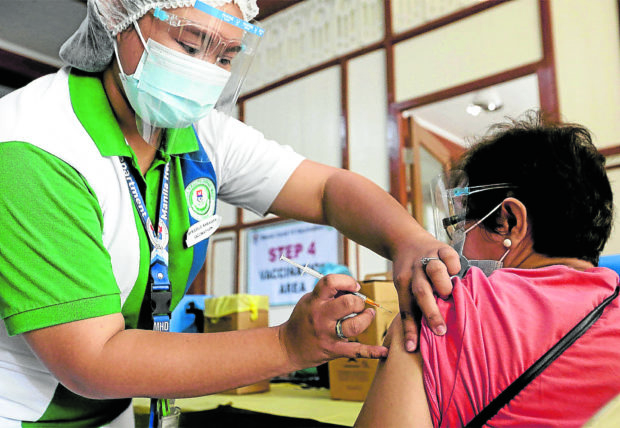Congress to expedite COVID-19 vaccine procurement

DRY RUN One of about 100 senior citizens taking part in the Manila City government’sCOVID-19mass vaccination dry run at Legarda Elementary School in Sampaloc, Manila, gets a mock shot —RICHARD A. REYES
MANILA, Philippines — As the wait for the vaccines against COVID-19 continues, the Senate and the House of Representatives aim to pass within the week their respective bills expediting procurement of the jabs by authorizing local governments to make advance payments to drug manufacturers and setting up an indemnity fund for unforeseen events.
But it is not yet clear whose version will prevail. Senate Bill No. 2057 and House Bill No. 8648 have both been certified as urgent by President Duterte despite major differences between them.
The Senate bill, for example, seeks to establish a P500 million fund to indemnify patients who may suffer adverse side effects from the shots, while the House version does not specify an amount.
Immunity clause
The Senate bill has a clause giving immunity to officials carrying out the COVID-19 vaccination program, while the House bill does not. The Senate bill also provides for the issuance of a vaccine passport to all Filipinos with their vaccination records, which is absent in the House bill.
The two bills both state that cities and towns may only enter into supply deals with pharmaceuticals in tripartite agreements involving the national agreement, and the local governments may pay up to 50 percent in advance, waiving restrictions in the procurement, auditing and local government codes.
Article continues after this advertisementBut the Senate bill sets a 50-percent cap on the target population to be inoculated by local governments, which is absent in the House version. The Senate bill also states that private entities may not be offered more favorable terms than the national government, while the House bill is silent on this.
Article continues after this advertisement“We will have a dialogue by tomorrow to discuss the possibility of version adoptions,” Senate President Vicente Sotto III told the Inquirer.
He said both chambers could dispense with bicameral conference talks to reconcile conflicting sections in the two measures by picking one version and having the other adopt it.
“That’s the plan, barring unforeseen circumstances,” he said in a series of text messages.
Sen. Juan Edgardo Angara, chair of the Senate finance committee, said he preferred having no bicameral discussions anymore since the two versions were generally “similar.”
“If there are amendments, I expect only a few of them,” he said in a radio interview on Sunday.
Silver lining
While his peers vented their frustration over the delay in the Philippines’ vaccination rollout, Sotto said there could be a silver lining to the prolonged wait—the chance to study what other countries were doing wrong.
“[It’s a] blessing in disguise because we are learning from the mistakes of the early birds,” he said in text messages to the Inquirer.
During his sponsorship speech on SB 2057, a measure to expedite vaccine procurement, Senate President Pro Tempore Ralph Recto said the country seemed to have been left behind.
“Sadly, Mr. President, we seem to be at the tail end of the vaccine race, overtaken by countries with fewer resources, when we with more resources and more cases should be getting more,” he said on Tuesday.